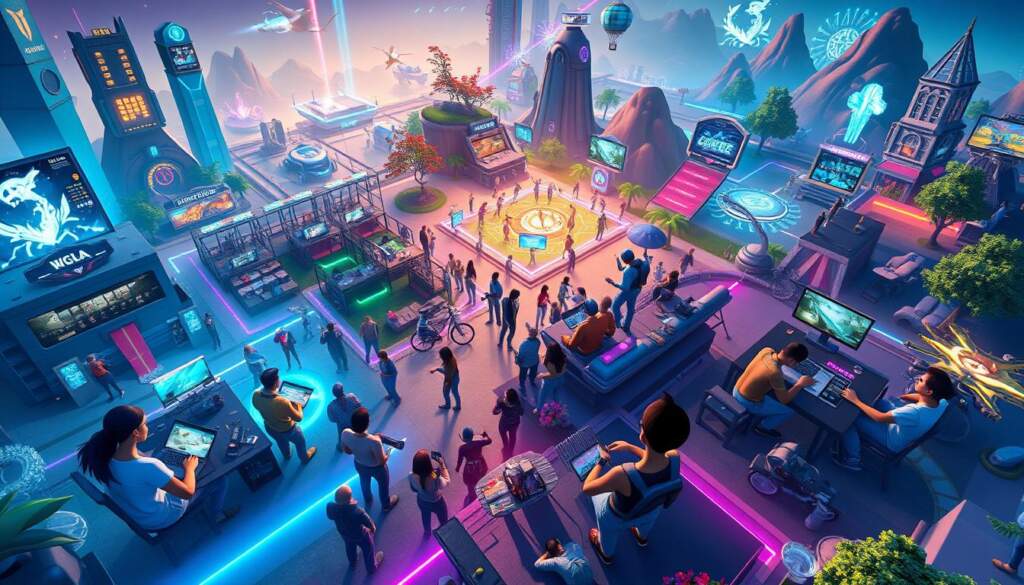Once a niche hobby, the gaming industry has burgeoned into a defining pillar of modern entertainment, rivaling even the most established forms of media in scale and influence. This seismic entertainment evolution is not just about the advanced interactive media that video games provide but also about the profound cultural impact of video games. They have become not mere distractions but significant economic forces—creative outlets and interactive platforms that merge leisure with learning, social connections, and technological breakthroughs.
With financial figures that speak volumes—billions in revenue and job creation across the globe—the gaming industry’s significance is irrefutable1. The attraction is universal, drawing over a billion online gamers into robust virtual communities, offering not just entertainment but camaraderie and social support1. Moreover, this dynamic sector isn’t just driving the economy but is on the frontlines of tech innovation, from graphics to artificial intelligence1. Educational spheres are tapping into this potential too, leveraging interactive gaming for cognitive enhancement and more effective learning experiences1.
Key Takeaways
- The gaming industry is now a major economic power with a growing workforce1.
- Interactive media and video games have become a significant part of cultural evolution1.
- Communities and friendships are being forged in digital realms, influencing social interaction dynamics1.
- Entertainment now overlaps with learning and development, as video games become tools for education and cognitive growth1.
- Innovation in technology is intertwined with the development of video games, driving advancements across multiple sectors1.
- The cultural impact of video games extends to promoting social impact, inclusiveness, and advocacy1.
The Evolution of Gaming from Pastime to Cultural Mainstay
The dynamic world of video gaming has dramatically evolved, transitioning from a simple hobby to an influential cultural fixture. This transformation is underscored by the increasing demographic diversity in gaming, which contributes to its emergence as a significant element of pop culture.
Gaming Across Demographics: Breaking the Age Barrier
The landscape of gaming is characterized by its broad appeal across various age groups. Notably, 26% of players are under 18, while a significant portion, 35%, fall within the 18-34 age bracket, and 14% are aged 55 or older2. This demographic diversity not only enlarges the market but also fosters an inclusive environment that spans generations, proving that gaming is no mere youth-centric pastime but a lifelong hobby for many.
Video Games in the Limelight: Becoming Icons of Pop Culture
With 96% of respondents acknowledging the benefits of video gaming2, it’s no surprise that games and their characters have permeated mainstream media, manifesting as icons of pop culture influence. Influential titles like “Fortnite” have shown remarkable penetration into daily life and media, achieving a robust 25% increase in annual revenue despite market fluctuations3. This blurring of lines between gaming and mainstream entertainment channels demonstrates the sector’s significant footprint in popular media narratives.
Game Characters Leap off the Screen: Influence on Mainstream Media
Iconic video game characters such as Lara Croft and Pikachu have transitioned from the gaming screens to become staple figures in mainstream media. Their narratives extend beyond the gaming community, influencing various forms of media and emerging as beloved figures across multiple platforms. This expansion is complemented by the fact that gamers utilize diverse media platforms, with 58% using multiple devices for gaming2, showcasing the fluid nature of gaming in today’s media landscape.
| Age Group | Percentage | Favorite Gaming Device |
|---|---|---|
| Under 18 | 26% | Smartphones |
| 18-34 | 35% | Consoles |
| 35-44 | 14% | PCs |
| 45-54 | 11% | PCs |
| 55 or older | 14% | Tablets |
This table elucidates the preferred gaming devices across different age groups, reflecting the varied nature of gaming engagement across the demographic spectrum2. It highlights just how ingrained gaming has become in daily life, mirroring trends in demographic diversity in gaming and further embedding it into the cultural milieu.
Digital Playgrounds: The Proliferation of Social and Online Gaming
As the digital landscapes expand, online gaming communities have significantly transformed into bustling social hubs, where interactions go beyond mere gaming experiences to form meaningful virtual relationships and promote social interaction in unique, immersive environments. The presence of games specifically designed to foster community engagements, such as the well-known platforms like Minecraft and Rocket League, highlights the shift in gaming paradigms from solitary adventures to collaborative enterprises.
Building Communities One Game at a Time
The integration of social components within video games has invigorated a unique method of community building. Players are not merely competitors or solo adventurers but also collaborators and companions in increasingly intricate virtual worlds. This evolution has allowed players from various backgrounds to connect, share experiences, and support one another, manifesting a robust infrastructure of online gaming communities.
Online Relationships Forged in Virtual Worlds
Within these digital realms, personal interactions have evolved from simple multiplayer scenarios to complex social networks where permanent virtual relationships can be formed. Virtual weddings in games like Final Fantasy XIV and long-term guild memberships in World of Warcraft showcase the depth of connection achievable in these settings, rivaling real-world relationships in their emotional connectivity.
Turning Play into Purpose: Charitable Gaming Initiatives
The gaming industry has also seen a surge in initiatives that harness the communal spirit of gamers for philanthropic endeavors. Events like charity streams and eSports tournaments for causes have effectively turned gaming for charity into a phenomenon that not only entertains but significantly impacts the world outside virtual boundaries. Studies indicate that events like these have raised millions for various charities4.


The blend of entertainment with conscious charity demonstrates the altruistic potential of gaming networks. These gatherings not only provide entertainment but also facilitate substantial social interaction and cooperation towards common humanitarian goals. By leveraging the accessibility and global reach of online platforms, these charitable activities amplify the positive impact of gaming on society at large4.
In conclusion, the digital age has refined how we perceive and engage in play. From forming lasting friendships to fundraising for global causes, the landscape of online gaming communities and virtual relationships continues to evolve, underscoring the power of digital playgrounds not just as sites of entertainment, but as pivotal platforms for social innovation and charitable efforts.
Video Games in the Fabric of Education and Cognitive Development
The intersection of gamification and education has fostered an environment where cognitive skills are notably enhanced through the strategic application of educational games. This immersive form of interactive learning not only captivates but crucially builds essential skills like problem-solving and decision-making.
Statistics highlight the profound impact of gamification on cognitive development: A study encompassing nearly 2000 students revealed that those engaging in video games for three hours daily exhibited superior performance in cognitive tasks compared to their non-gaming peers5. This aligns with broader trends, where 75% of US K-8 teachers integrate gamification into their curriculum, recognizing its benefits in promoting engagement and interactive learning5.
- Enhanced Engagement: Implementing gamified techniques in educational settings can boost student engagement levels by up to 40%, according to the Journal of Smart Learning Environments5.
- Serving Special Needs: For children with autism, gamified learning approaches have shown promising results in increasing engagement, progress, and overall happiness, fostering a supportive learning landscape5.
The adaptation of video games in educational frameworks is not merely a trend but a robust approach towards enriching traditional teaching methods. As the educational games market advances, with a projected growth rate of 12.9% up to 20255, the integration of these tools into mainstream education appears inevitable, promising transformative impacts on educational methodologies globally.
In conclusion, gamification is transforming not just educational outcomes but the very fabric of how learning is approached, making it more dynamic, personalized, and aligned with the digital age’s demands. Educators and developers continue to explore this synergy, aiming to maximize both engagement and educational efficacy.
Gaming Economy: A Thriving Sector of Technological Innovation
The video game industry has burgeoned into a robust pillar of global economics, substantiated by staggering figures and continued projections for growth. In 2020, this sector alone generated a remarkable $155 billion in gaming revenue, underscoring its significant economic impact6. Analysts now anticipate that by 2025, the industry will further swell to generate over $260 billion in revenue6.
The Financial Might of the Gaming Industry
With over two billion gamers around the world, making up 26% of the global population, gaming has transcended beyond mere entertainment to a major economic force6. The United States has seen substantial financial contributions from this booming industry. In 2023, it produced a colossal $329 billion in business output, accounting for a significant portion of federal, state, and local taxes estimated at around $53 billion7. Reflecting the industry’s vast employment spectrum, over 700,000 U.S. jobs have derived from the video game sector, with an average salary reflecting the premium nature of these roles7.
Indie Studios: Pioneers of Creativity and Diversity in Gaming
Indie game development continues to play a pivotal role in the industry’s dynamics, functioning as crucibles of creativity and diversification. These smaller studios are not only key to driving technological innovation but also vital in shaping unique gaming experiences that challenge conventional narratives and extend the boundaries of traditional gaming.
Games as Catalysts for Cutting-edge Tech Developments
Gaming’s influence on technological innovation is profound. Its demand for enhanced graphics, faster processing speeds, and more immersive experiences has spurred advances in hardware and artificial intelligence. Notably, California-based Roblox Corporation highlights this trend, holding a staggering market capitalization of $74.88 billion as of November 2021, illustrating the substantial economic potential within this sector6.
The industry’s quest to enhance user engagement and interactivity continually fuels advancements that not only elevate game design but transcend into sectors such as virtual reality, enhancing applications in fields like healthcare and education.


Moreover, esports has surged as a significant contributor to gaming revenue, with its extensive viewership cultivating substantial earnings through sponsorships, broadcasting rights, and merchandise sales. This segment alone demonstrates the powerful economic impact and far-reaching implications of gaming, promoting a globalized market and fostering international trade of gaming products and services7.
Conclusion
The trajectory of video games from simple leisure activities to pillars of societal innovation and economic vibrancy cannot be overlooked. With billions of players globally reveling in the thrill of gaming and audiences for esports rivaling those of traditional sports, the future of gaming is not just an unfolding reality, but a testament to the industry’s expansive reach and potential across various sectors8. Not merely confined to the realm of entertainment, video games have become significant in education with tools like Minecraft: Education Edition, and in professional development, aiding in medical and military training through serious games and simulations8.
As game-makers continue to push the envelope, they partner with supportive institutions to ensure that titles like Kerbal Space Program not only entertain but educate, hence reinforcing the role of gaming in cognitive development8. Meanwhile, the gaming community has shown a generous spirit, raising millions for charitable causes and displaying the empathy that underscores gaming’s impact beyond the screen8. Such collaborative efforts exemplify the sector’s capability to foster a more connected and inclusive society.
Moreover, with the recognition of diverse gaming demographics, understanding the significance of responsible gaming has never been more crucial. Designations by the WHO and continuous monitoring by entities like the ESRB indicate a commitment to addressing challenges such as gaming addiction and the impact of content on behavior9. The future remains promising: by championing innovation, inclusivity, and responsible consumption, the world of video games is poised to continue its rise as a formidable force in shaping culture, technology, and education. Embrace the journey ahead, where the controller leads not only to adventure but also to a legacy of learning and growth.
FAQ
How has the gaming industry transformed the landscape of entertainment?
What evidence suggests that video gaming is now a cultural mainstay?
How are video games influencing mainstream media?
In what ways are video games contributing to social interaction and community building?
Can video games be a force for good in charitable causes?
What role do video games play in education and developing cognitive skills?
How is the economic impact of video gaming shaping the industry’s future?
What is the contribution of indie game developers to the gaming industry?
How are advancements in gaming technology influencing other industries?
What does the future hold for the gaming sector and its role in society?
Source Links
- Council Post: Gaming Beyond Entertainment: How Video Games Are Shaping The Future – https://www.forbes.com/councils/forbestechcouncil/2024/05/22/gaming-beyond-entertainment-how-video-games-are-shaping-the-future/
- Video Games Remain America’s Favorite Pastime With More Than 212 Million Americans Playing Regularly – https://www.theesa.com/video-games-remain-americas-favorite-pastime-with-more-than-212-million-americans-playing-regularly/
- Video games: from niche pastime to mainstream entertainment – QuotedData – https://quoteddata.com/2020/06/video-games-niche-pastime-mainstream-entertainment/
- Digital Gaming and the Media Playground – http://digfir-published.macmillanusa.com/mediaculture10e/mediaculture10e_ch3_7.html
- Why Video Games are Good for Kids! – K12 Digest – https://www.k12digest.com/why-video-games-are-good-for-kids/
- How the Video Game Industry Is Changing – https://www.investopedia.com/articles/investing/053115/how-video-game-industry-changing.asp
- How do video games affect the economy in the digital age? – https://mainleaf.com/how-do-video-games-affect-the-economy/
- How Video Games Have Changed The World – https://www.masterycoding.com/blog/how-video-games-have-changed-the-world
- The Impact of Video Games – https://www.sutterhealth.org/health/parenting-preteens-teens/digital-safety/video-games





